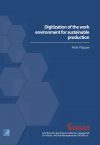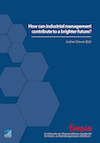Search


Bibtex
Cite as text
@Book{Plapper,
Cite-key = "wgab2022",
Year= "2022",
Volume= "Schriftenreihe der Wissenschaftlichen Gesellschaft für Arbeits- und Betriebsorganisation (WGAB) e. V.",
Pages= "239, ISBN 978-3-95545-407-4",
Journal = "WGAB",
Title= "Digitization of the work environment for sustainable production",
Author= "Peter Plapper (Ed.)",
Doi= "https://doi.org/10.30844/wgab_2022",
Abstract= "Sustainability is gaining importance and the economy is changing into a circular economy, especially with regard to climate change and the need to create more resilient value chains. The organization of work is meeting these challenges with, among other things, the digitalization of increasingly changeable production. Collecting and understanding data is becoming increasingly complex, as not only internal production data is of interest, but also cross-company sustainability indicators play a role in decision-making. The research results presented under the main topic “Digitization of the work environment for sustainable production” address this problem of compliance with sustainability requirements by means of digitization and its impact on the workplace and workers. The members of the Scientific Society for Work and Business Organisation (WGAB) present innovative concepts and research results for practitioners and scientists and thus provide valuable input for current challenges.
",
Keywords= "circular economy, digitization, sustainable production, sustainability, value chain",
}
Peter Plapper (Ed.)(2022): Digitization of the work environment for sustainable production. Schriftenreihe der Wissenschaftlichen Gesellschaft für Arbeits- und Betriebsorganisation (WGAB) e. V.(2022), S. 239, ISBN 978-3-95545-407-4. Online: https://doi.org/10.30844/wgab_2022 (Abgerufen 23.02.26)
Open Access
Abstract
Abstract
Sustainability is gaining importance and the economy is changing into a circular economy, especially with regard to climate change and the need to create more resilient value chains. The organization of work is meeting these challenges with, among other things, the digitalization of increasingly changeable production. Collecting and understanding data is becoming increasingly complex, as not only internal production data is of interest, but also cross-company sustainability indicators play a role in decision-making. The research results presented under the main topic “Digitization of the work environment for sustainable production” address this problem of compliance with sustainability requirements by means of digitization and its impact on the workplace and workers. The members of the Scientific Society for Work and Business Organisation (WGAB) present innovative concepts and research results for practitioners and scientists and thus provide valuable input for current challenges.
Keywords
Schlüsselwörter
circular economy, digitization, sustainable production, sustainability, value chain
References
Referenzen
DOI: https://doi.org/10.30844/WGAB_2022_1
Improving Sustainability of Footwear Production through 3D Printing of Shoes
Markus Trapp1, Markus Kreutz2, Michael Lütjen1, Michael Freitag1,2
1 BIBA – Bremer Institut für Produktion und Logistik an der Universität Bremen
2 Universität Bremen, Fachbereich Produktionstechnik
DOI: https://doi.org/10.30844/WGAB_2022_2
Enhancing digital transformation in SMEs with a multi-stakeholder approach – Implications from a socio-technical systems perspective
Michael Herzog1, Uta Wilkens2, Florian Bülow1, Saskia Hohagen2, Valentin Langholf2, Esra Öztürk1, Bernd Kuhlenkötter1
1 Chair of Production Systems, Institute of Product and Service Engineering, Ruhr University Bochum
2 Chair for Work, Human Resources and Leadership, Institute of Work Science, Ruhr University Bochum
DOI: https://doi.org/10.30844/WGAB_2022_3
Review: Model-based Systems Engineering and Artificial Intelligence for Engineering of Sustainable Systems
Benjamin Schneider, Oliver Riedel, Wilhelm Bauer
Fraunhofer-Institut für Arbeitswirtschaft und Organisation IAO, Nobelstr. 12, 70569 Stuttgart
DOI: https://doi.org/10.30844/WGAB_2022_4
Circular supply chain management within the wind energy industry – conceptional ideas towards more circularity
Kathrin Julia Kramer, Matthias Schmidt
Institut für Produkt- und Prozessinnovation (PPI), Leuphana Universität Lüneburg
DOI: https://doi.org/10.30844/WGAB_2022_5
Towards Designing Adaptive and Personalized Work Systems in Manufacturing
Sebastian Schlund, David Kostolani
Institut für Managementwissenschaften, Technische Universität Wien
DOI: https://doi.org/10.30844/WGAB_2022_6
Human-Centered Design of Hybrid Cyber-Physical Production Systems
Use of Human Autonomy Teaming as a Future Way of Working
Hendrik Stern1, Michael Freitag1,2
1Universität Bremen, Fachbereich Produktionstechnik
2BIBA – Bremer Institut für Produktion und Logistik an der Universität Bremen
DOI: https://doi.org/10.30844/WGAB_2022_7
Advanced analytics applications in smart manufacturing – A systematic literature review on their perspectives, effects, and sustainability
André Ullrich, Michael Buchmin
University of Potsdam, Germany
DOI: https://doi.org/10.30844/WGAB_2022_8
A regional remanufacturing network approach – Modeling and simulation of circular economy processes in the era of Industry 4.0
Norbert Gronaua, Edzard Webera, Paul Wanderb, André Ullricha
aUniversity of Potsdam, Germany
bLeibniz Institute for Agricultural Engineering and Bioeconomy, Germany
DOI: https://doi.org/10.30844/WGAB_2022_9
Disruption Management in One-Off Production with Collaborative Digital Assistance Systems
Niklas Jahn, Tim Jansen, Robert Rost, Hermann Lödding
Institute of Production Management and Technology, Hamburg University of Technology
DOI: https://doi.org/10.30844/WGAB_2022_10
How could algae based sink technologies enable a neutral Product Carbon Footprint?
Jochen Deuse1,2, Florian Hoffmann2, Nathalie Sick1, Nick Bennett1, Thorsten Lammers1, Victor Hernandez Moreno1
1) Centre for Advanced Manufacturing, University of Technology Sydney 2) Institute of Production Systems, TU Dortmund University
DOI: https://doi.org/10.30844/WGAB_2022_11
Reciprocal Learning in Human-Machine Collaboration: A Multi-Agent System Framework in Industry 5.0
Steffen Nixdorf, Fazel Ansari, Sebastian Schlund
TU Wien

 Deutsch
Deutsch
